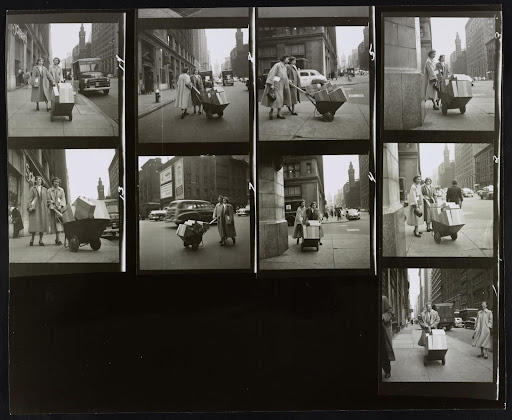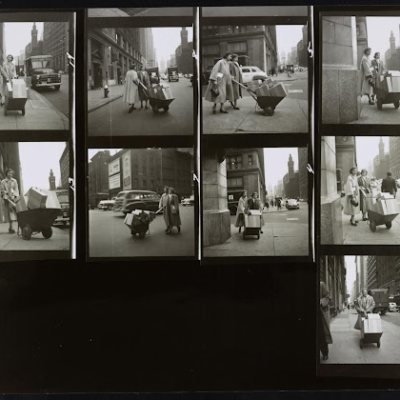“We succeeded because we were women”: Revisiting Images from the Early Days of Caedmon Records
June 5, 2024
Maya Schwartz


As part of The Tape Box series, Maya Schwartz undertakes a close listening to a rare series of photographs that are part of a larger story of audio recordings and of collaboration.
Barbara Holdridge: It was wonderful. Men were not hostile. They were very accepting. We found a young banker, a vice-president, who eventually lent us money. We used to trundle our little cart, named Mattiwilda, from our offices on 31st Street to the RCA plant on 24th Street and bring it back loaded with heavy boxes of records, long playing records. And along the way, dozens of men would spring to our sides to help us up the curb and down.
Marianne Mantell: Which we couldn’t have done by ourselves.
Eleanor Wachtel: You named your cart.
Marianne Mantell: Well why not.
Barbara Holdridge: Named after Mattiwilda Dobbs who was a reigning soprano of the time
Marianne Mantell: I would go that woman but one better. I think we probably succeeded where men would have failed because we were women. On the one hand, men were chivalrous. On the other hand, when they attempted to put us down because we were two girls, etc. etc. we outwitted them, we outsmarted them. Occasionally we drank them under the table. So I think in a major way, we were successful precisely because we were women.
*
The women are on the move. They are gaining ground, advancing down the street. They are both wearing long coats. While one of the women’s coats is done up with six double-breasted buttons at the nape of her neck, the other’s is open, revealing a white scarf tucked into a sweater or vest. They are both wearing pumps with a short heel and blunt toes. In addition to the records they have tucked under their arms, one carries a small purse. Each frame captures them in a different position: on the sidewalk, in the road, rounding a corner. In two frames they are in front of Schrafft’s at Madison Ave. and 58th St. In each frame they are uniquely oriented, in a different relation to each other. One grins while the other’s back is turned, or they walk seriously side by side. In one frame the woman with the open coat reaches to steady the pile of boxes on the cart in front of them. In the last frame there is someone new, a man. He wears a big fur collar over his suit and tie. His eyes slope downwards and he smiles proudly, guiding the cart with ease towards the camera. The woman with the six buttons stands to the side laughing, the hem of her coat swirling below the knee.
The cart’s name is Mattiwilda, named after Mattiwilda Dobbs, a reigning soprano of the time. Mattiwilda is wheelbarrow-esque with a large basin, two wheels and a long T-shaped handle that the man grips with both hands. Mattiwilda is loaded with square boxes of long playing records that the women, Barbara Holdridge and Marianne Mantell, are transporting from the RCA plant on 24th Street back to their offices on 31st Street in New York City. The boxes contain spoken-word recordings of literature that will soon be bought as mass-market entertainment and propagated in the living rooms of the American middle class. The boxes in the photos possibly contain recordings of Dylan Thomas reciting “Do Not Go Gentle” or “A Child’s Christmas in Wales,” Thomas Mann reading in German, or Laurence Olivier performing Shakespeare or Chekhov. Holdridge and Mantell, two recent college graduates, recorded these readings themselves, for their label, Caedmon Records.
As part of Caedmon’s 50th anniversary celebration in 2002, Holdridge and Mantell talked with Eleanor Wachtel for CBC’s Writers and Company. In the interview, they describe the inception of their business, the process of getting authors to record, and their experience as women in the industry. They talk specifically about their choice to name their cart Mattiwilda, and how men would stop them on the street to help them lift it up and down the curb, “which we couldn’t have done by ourselves,” says Mantell. Dr. Michelle Levy and I pulled from this interview for our own SpokenWeb Podcast episode, “Two girls recording literature: Re-listening to Caedmon recordings,” released in March 2024.
While producing the episode, Levy located a contact sheet of photographs taken of the women by Philip A. Harrington, for Look Magazine, in 1953. The photographs depict Holdridge and Mantell in the exact situation they describe to Wachtel: trundling their cart between 24th and 31st, a man appearing out of thin air to help. It is unclear whether Mantell is honest when she says that they could not have done it by themselves, but either way the photographs exude the sense that whether it was chivalry or prejudice that they encountered, Holdridge and Mantell “succeeded [precisely] because we were women.” This reality is also represented in the placement of the final photograph on the sheet, in which the man pushes the cart. He hangs off the end, like an accessory to the two even rows of images that follow Holdridge and Mantell as they make their way through the city.
Works Cited
Harrington, Philip A. “[Marianne Roney and Barbara Cohen of Caedmon Publishing Company pushing a
wheelbarrow full of boxes of their recordings of modern literature in New York City]”. December, 1953.
“How two young women captured the voices of literary greats and became audiobook pioneers.”
Writers and Company. CBC, July, 2023.
https://www.cbc.ca/radio/writersandcompany/how-two-young-women-captured-the-voices-of-literary-greats-1.6912133. Accessed 14 Nov. 2023.
Levy, Michelle and Maya Schwartz. “Two girls recording literature: Re-listening to Caedmon
recordings.” SpokenWeb Podcast,
https://spokenweb.ca/podcast/episodes/two-girls-recording-literature-re-listening-to-caedmon-rec
ordings/, March 2024.
Williams, Alex. “Marianne Mantell, Who Helped Pave the Way for Audiobooks, Dies at 93.” The New
York Times, 9 Feb. 2023, https://www.nytimes.com/2023/02/09/arts/marianne-mantell-dead.html.
Accessed 22 April 2024.

